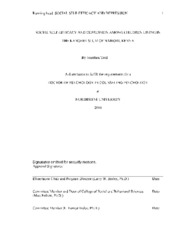Social Self-Efficacy and Depression Among Children Living in the Kangemi Slum of Nairobi, Kenya
Abstract
Social self-efficacy plays an important role in one's psychological well-being, and a low sense of social self-efficacy is often associated with depression. But, does the relationship between social self-efficacy and depression hold true when measured among some of the world's most impoverished children and adolescents? The researcher analyzed the correlation between depression and social self-efficacy among children and adolescents (N=63) living in the Kangemi slums of Nairobi, Kenya and hypothesized that a negative correlation would be found between the two variables. The researcher also analyzed the correlation between depression and social self-efficacy in both conflict and non-conflict situations and hypothesized that a negative correlation would be found between depression and social self-efficacy in only non-conflict situations. Consideration was given to gender differences. Data were collected using Wheeler and Ladd's Self-Efficacy in Peer Interactions and Kovacs' Children's Depression Inventory. Results from the study indicated a significant negative correlation between depression and social self-efficacy among children living in Kangemi, p =.008. A negative correlation was also found between depression and social self-efficacy in non-conflict situations, p =.026, but no correlation was found between the variables in conflict situations. Therapy and/or didactic instruction are important aspects to raising social self-efficacy and, given the proper training, Hamomi's staff are in a position to give such assistance. Bandura stated that self-efficacy is the byproduct of one�s confidence and that a prosocial orientation reduces one's susceptibility to depression. Evidence now indicates that this is true for the young people of Nairobi's slums as well.
Original item type
PDF
Original extent
80 pages
Collections
Copyright
This original work is protected by copyright. Copyright is retained by the author(s). Works may be viewed, downloaded, or printed, but not reproduced or distributed without author(s) permission.


 Maintained by the Northwest University Library
Maintained by the Northwest University Library